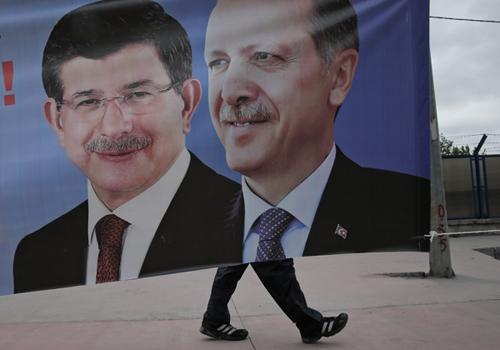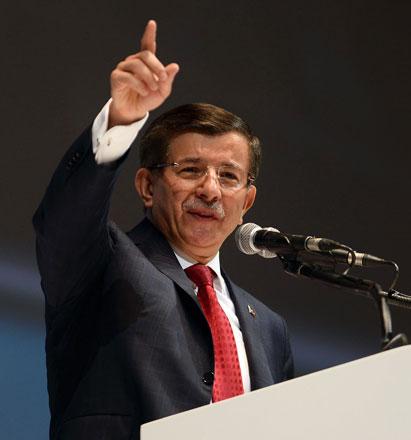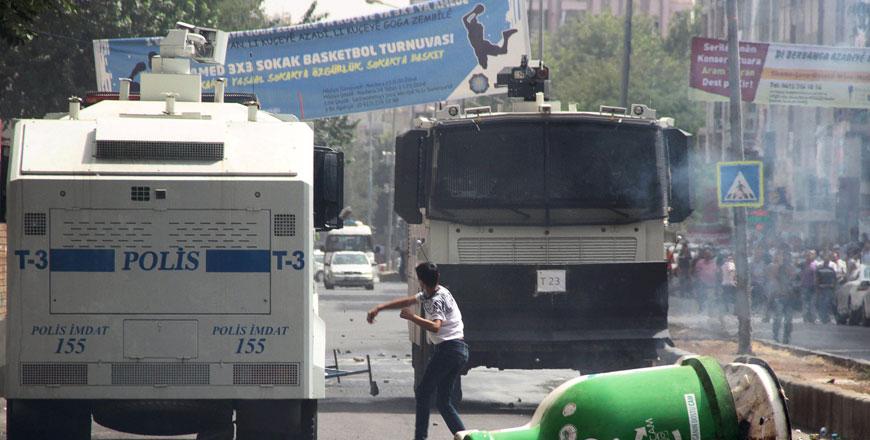You are here
Dissent stifled, not crushed, in Turkish ruling party as PM exits
By Reuters - May 09,2016 - Last updated at May 09,2016

In this May 28, 2015, file photo, a man walks past a poster with pictures of Turkish Prime Minister and leader of the AKP Party Ahmet Davutoglu (left) and Turkey’s president, Recep Tayyip Erdogan, also the party’s former leader, in Istanbul (AP photo)
ANKARA — Turkish President Recep Tayyip Erdogan may have stamped his authority on the ruling AK Party with the exit of Prime Minister Ahmet Davutoglu, but the move has pushed dissent underground rather than cementing unity in its ranks.
Davutoglu's announcement that he will not run again for leader of the AKP at a party congress on May 22, and therefore step down as prime minister, consolidates Erdogan's hold as he seeks support for a full presidential system.
But it also highlights cracks behind the monolithic facade of the AKP, which was founded by Erdogan 15 years ago and has governed Turkey ever since, overseeing in its early years sharp increases in the NATO member's wealth and influence.
"There is a team within the party which is uncomfortable with the way things have emerged, that much is true," one senior AK Party official told Reuters, asking not to be identified because of the sensitivity of the issue.
In the short term there was little chance of open division, the official said, pointing to Davutoglu's valedictory speech last Thursday in which he defended his record as prime minister but urged party unity and vowed never to speak ill of Erdogan.
"Erdogan is unquestionably the one leader," the official said, but added that the rumblings of discontent could come back to haunt him. "If things do not go well, the fault lines may be revived and the dissenting voices may gain new support."
Erdogan's latest moves have angered opponents outside the AKP, who accuse him of trampling over the constitution by engaging in party politics despite being a supposedly non-partisan head of state. Erdogan denies this, saying he is acting within his legitimate powers as a democratically-elected president.
He has also worried Western allies and foreign investors, who fear a stronger Erdogan presidency without checks and balances could lead to the erosion of the rule of law in a country that is central to the US-led fight against Daesh and Europe's efforts to contain a migration crisis.
Erdogan still faces a difficult path to securing the constitutional change he wants to replace Turkey's parliamentary democracy with a Turkish version of the US or French system, where the elected head of state holds executive power.
To avoid a referendum and change the constitution directly, the AKP would need two-thirds of the 550 seats in parliament — 50 more than the 317 the AKP currently holds. It would be a secret ballot, meaning some AKP deputies could vote against.
"What he wants is total obedience. That is why it didn't work with Davutoglu," said a second AKP official, a former member of the party's executive committee who was close to then-president Abdullah Gul. Like Davutoglu, Gul was once seen as a counterweight to Erdogan's influence in the party.
"The struggle within the AKP must continue. This party is ours, we're not thinking of giving up and going," he said, although he acknowledged, when asked, that he did not know what form the struggle might take.
Dissenters sidelined
But it would be a brave man who bets against Erdogan.
Less than a week before Davutoglu announced he was stepping down, the AKP stripped him of the authority to appoint its provincial officials in a move that cut his links to grass roots supporters and consolidated Erdogan's influence.
Only three members of the 51-strong executive committee voted against the move, in a sign of where the power lay. Even Davutoglu voted in favour of the change in a last-ditch attempt, officials said, to avoid an open confrontation.
"There may be a sad 'opposition' wing in the party, but it doesn't appear possible for there to be open division," said another senior AKP official close to the presidency. He estimated the number of dissenters in any secret ballot in the party would be no more than 10.
"Of course, in critical votes like constitutional change, 10 votes will be very important. But with time, as the dust settles, it is possible this risk will be removed."
Erdogan could seek an early general election to try to shake out dissenting voices in the AKP, capitalise on weaker support for the pro-Kurdish opposition, and exploit a leadership crisis in the nationalist MHP, which could bolster the AKP's majority.
Erdogan has an established record of sidelining dissenters in the party. Former finance minister Abdullatif Sener, a co-founder of the AKP, split to form a new party in 2009 after falling out with Erdogan but it closed within three years.
Former president Gul and then-deputy prime minister Bulent Arinc differed with Erdogan — then prime minister — over his handling of widespread anti-government demonstrations in 2013 and their departure from frontline politics quickly followed.
"What they have demonstrated over their political history... is this instinct to coalesce around Erdogan, which basically trumps everything else," said Sinan Ulgen, a former diplomat and head of the EDAM think-tank in Istanbul. "That is something peculiar to the AKP and to Erdogan."
A column in the pro-government Star newspaper the day after Davutoglu announced his departure painted a rare picture of cracks in the party. Columnist Ahmet Tasgetiren wrote that the prime minister's exit had "created concern, sadness and resentment" among some of in the party grassroots.
But the dissenters are keeping a low profile for now, watching his progress towards the executive presidency and a possible referendum on constitutional change.
"Everything depends on this referendum. If he succeeds, they would be resigned to their fate and take whatever role is assigned to them in Erdogan's Turkey," said Atilla Yesilada, an analyst at Global Source Partners who advises foreign investors.
"Otherwise we will see a massive power struggle within AKP."
Related Articles
ANKARA — Turkey's ruling party is set to replace Prime Minister Ahmet Davutoglu at an extraordinary congress in the coming weeks, officials
ANKARA — Turkey's ruling AK Party re-elected Prime Minister Ahmet Davutoglu as its chairman at a congress on Saturday where the longest shad
ISTANBUL — As extremist violence and political uncertainty cast a shadow over Turkey, voters are looking for Sunday's parliamentary election













